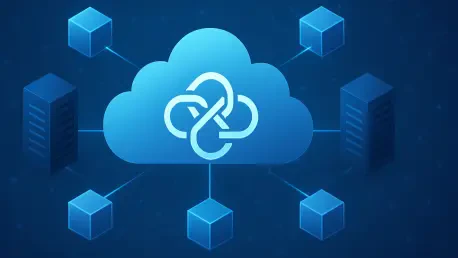The landscape of modern technology is undergoing a profound transformation, with decentralized cloud infrastructure emerging as a critical solution to the persistent challenges of scalability and reliability in computing systems. Experts like Avery Ching from Aptos Labs have spotlighted this shift as a vital response to the shortcomings of centralized cloud models, which often grapple with bottlenecks and single points of failure under the strain of today’s data-intensive demands. Far from being a mere technical tweak, decentralization is proving to be a foundational pillar for cutting-edge industries such as blockchain and artificial intelligence (AI). This evolution not only promises to enhance system performance but also carries significant implications for the cryptocurrency markets intertwined with these technologies. By delving into this paradigm shift, a clearer picture emerges of how decentralized cloud systems are poised to redefine innovation and financial opportunities on a global scale.
Addressing Limitations with Decentralized Systems
The dominance of centralized cloud systems in the tech world is increasingly under scrutiny as their limitations become more apparent in the face of rapid digital expansion. These systems frequently struggle with scalability constraints and are prone to disruptions due to their reliance on singular hubs, creating vulnerabilities that can halt operations across critical sectors like finance and data processing. Decentralized cloud infrastructure presents a compelling alternative by distributing resources across a vast network of nodes, significantly reducing the risk of systemic failure. This approach ensures that even if one node encounters issues, others can seamlessly maintain functionality, offering a level of resilience that centralized setups often lack. Such a structure is particularly vital for applications requiring uninterrupted service, paving the way for more robust technological frameworks that can adapt to escalating demands without compromising efficiency or security.
Moreover, the shift to decentralized cloud systems isn’t merely about avoiding pitfalls—it’s about unlocking potential that centralized models cannot match. By spreading computational power and storage across diverse locations, these systems can handle larger volumes of data with greater speed, addressing the needs of high-performance environments. Blockchain technology, for instance, benefits immensely from this setup, as it requires consistent uptime and rapid transaction processing to maintain user trust and operational integrity. Beyond immediate technical gains, this infrastructure fosters innovation by allowing developers to experiment with new applications without the constraints imposed by centralized bottlenecks. As industries continue to grapple with the exponential growth of digital interactions, embracing decentralization appears not just as a strategic choice, but as an essential step toward building sustainable, future-ready systems that can withstand the pressures of tomorrow’s challenges.
Blockchain’s Synergy with Decentralized Infrastructure
Blockchain technology, built on the ethos of decentralization, finds a natural ally in decentralized cloud infrastructure, with projects like Aptos leading the way in harnessing this synergy for enhanced performance. Aptos employs advanced consensus mechanisms to bolster the scalability and reliability of decentralized applications (dApps), ensuring they can support a growing user base without faltering. This alignment with blockchain’s core principle of eliminating intermediaries strengthens the trust and security inherent in these systems, making them ideal for applications ranging from financial services to supply chain management. The result is a more accessible and efficient digital ecosystem where transactions and interactions occur seamlessly, reinforcing blockchain’s promise of a decentralized future that prioritizes transparency over centralized control.
Additionally, the impact of decentralized cloud systems on blockchain extends beyond technical enhancements to influence the broader adoption of these technologies. By mitigating issues like network congestion and high latency, which have historically hindered blockchain’s mainstream acceptance, this infrastructure enables platforms to cater to real-world needs more effectively. For example, faster transaction processing and lower operational costs make blockchain solutions more appealing to businesses seeking innovative ways to streamline operations. This creates a ripple effect, encouraging developers to build more sophisticated dApps that can compete with traditional systems on both functionality and cost. As blockchain platforms like Aptos continue to leverage decentralized clouds, they position themselves at the forefront of a technological wave that could redefine how digital trust and value exchange are perceived across industries.
Revolutionizing AI through Decentralized Resources
Decentralized cloud infrastructure is also making waves in the realm of artificial intelligence, an industry that demands immense computational resources and secure data handling to drive innovation. Unlike centralized providers such as Amazon Web Services, which can impose high costs and potential single-point failures, decentralized systems offer a flexible and resilient alternative for AI workloads. By distributing processing power across multiple nodes, these clouds ensure that AI models can be trained and deployed with greater efficiency, even under heavy demand. This capability is sparking interest in projects like Render (RNDR), which focuses on decentralized GPU rendering, highlighting how such infrastructure can support specialized AI tasks. The fusion of these two frontier technologies signals a transformative era where computational barriers are dismantled.
Furthermore, the marriage of AI and decentralized cloud systems opens up new possibilities for cross-sector innovation that could reshape entire markets. AI applications, from predictive analytics to natural language processing, often require vast datasets and real-time processing that centralized systems struggle to provide without significant investment. Decentralized clouds democratize access to these resources, enabling smaller firms and independent developers to compete with tech giants in creating cutting-edge solutions. This democratization not only accelerates AI development but also fosters a diverse ecosystem of tools and platforms that can address niche needs. As tokens associated with these initiatives gain traction, the financial markets tied to AI and decentralization are likely to see increased activity, underscoring the profound impact of this technological convergence on both innovation and investment landscapes.
Financial Waves in Cryptocurrency Markets
The transition to decentralized cloud infrastructure is creating significant ripples in cryptocurrency markets, where technological advancements often translate into financial opportunities. Tokens associated with scalable blockchain projects, such as Aptos (APT), are experiencing heightened interest from institutional investors, a trend reflected in trading volumes averaging $300 million daily. Market indicators like support and resistance levels are becoming critical tools for navigating price movements, as the excitement around decentralization fuels bullish sentiment. This isn’t just a niche phenomenon—broader adoption of decentralized technologies is driving liquidity and attention across the crypto space, positioning certain tokens as focal points for both retail and institutional capital seeking exposure to this transformative shift.
Equally important is the way these technological developments influence market dynamics beyond mere price trends. The narrative of scalability and reliability resonates strongly with investors, often correlating with spikes in on-chain activity, such as increased transaction counts and active addresses. This heightened engagement suggests a growing confidence in the practical utility of blockchain projects supported by decentralized clouds. For traders, the implications are clear: staying attuned to news of adoption and infrastructure upgrades can provide a competitive edge in anticipating market shifts. As institutional flows continue to shape liquidity in major trading pairs, the crypto market’s response to decentralization underscores a broader recognition of its potential to redefine not just technology, but also the financial systems that underpin digital assets.
Industry-Wide Shift to Distributed Models
Looking at the bigger picture, the pivot to decentralized cloud infrastructure mirrors a sweeping industry consensus that centralized systems are ill-equipped to handle the complexities of modern applications. From layer-2 scaling solutions on Ethereum to substantial funding rounds for blockchain startups like Aptos Labs, the momentum toward distributed systems is unmistakable. This trend transcends the crypto sector, impacting AI and other data-intensive fields where the demand for reliable, scalable infrastructure is paramount. The recognition of decentralization as a cornerstone of future tech development is evident in the growing investments and partnerships aimed at building robust distributed networks, signaling a fundamental shift in how industries approach technological challenges.
Moreover, this industry-wide movement is reshaping perceptions of what constitutes a sustainable tech ecosystem, as stakeholders prioritize resilience over convenience. Centralized systems, once heralded for their simplicity, are now seen as liabilities in an era where data breaches and service outages can have catastrophic consequences. Decentralized infrastructure, by contrast, offers a framework that inherently mitigates these risks through its distributed nature, ensuring continuity even in adverse conditions. This shift is not just technical but cultural, as businesses and developers alike adapt to a mindset that values redundancy and security over centralized efficiency. As this paradigm gains traction, it sets the stage for a tech landscape that is more inclusive, adaptable, and prepared for the exponential growth projected in the coming years.
Navigating Trading Strategies in a New Era
For cryptocurrency traders, the rise of decentralized cloud infrastructure presents a wealth of actionable opportunities to engage with an evolving market. Strategies such as identifying price discrepancies in pairs like APT/BTC, often showing premiums of around 2%, allow for arbitrage plays that capitalize on market inefficiencies. Tools like the Relative Strength Index (RSI) further aid in timing entries and exits, providing insights into overbought or oversold conditions. Retail traders are advised to adopt cautious approaches, such as spot trading with stringent risk management, to mitigate volatility risks while still participating in the market’s upward trends. This dynamic environment rewards those who can align their strategies with technological narratives driving sentiment.
Beyond individual tactics, the broader influence of institutional interest in decentralized infrastructure is reshaping trading landscapes in significant ways. Venture capital inflows into blockchain projects are poised to enhance liquidity in major pairs involving Ethereum (ETH) and Solana (SOL), creating fertile ground for larger market participants. This influx often leads to tighter spreads and more stable price movements, benefiting traders who operate at scale. Meanwhile, retail investors can leverage smaller, yet impactful, strategies by focusing on adoption news and on-chain metrics as early indicators of price momentum. The interplay between tech advancements and market behavior in this space highlights a unique moment where informed trading decisions can yield substantial returns, provided they are grounded in a deep understanding of both the technology and the financial currents at play.
Reflecting on a Transformative Journey
Looking back, the insights shared by experts on decentralized cloud infrastructure marked a pivotal moment in addressing systemic challenges within distributed systems. The journey showcased how blockchain projects like Aptos spearheaded solutions for scalability, while AI applications found new strength in decentralized resources. Cryptocurrency markets felt the impact through heightened trading activity and institutional engagement, reshaping financial landscapes with each technological stride. Tokens tied to these innovations bore witness to evolving investor confidence, as market sentiment mirrored the promise of a decentralized future. The past convergence of these fields illuminated pathways for resilience and efficiency, setting a precedent for how technology and finance could harmonize. Moving forward, stakeholders must focus on sustaining this momentum by investing in interoperable systems and fostering collaborations that bridge technical and market divides, ensuring that the benefits of decentralization continue to unfold across industries.









